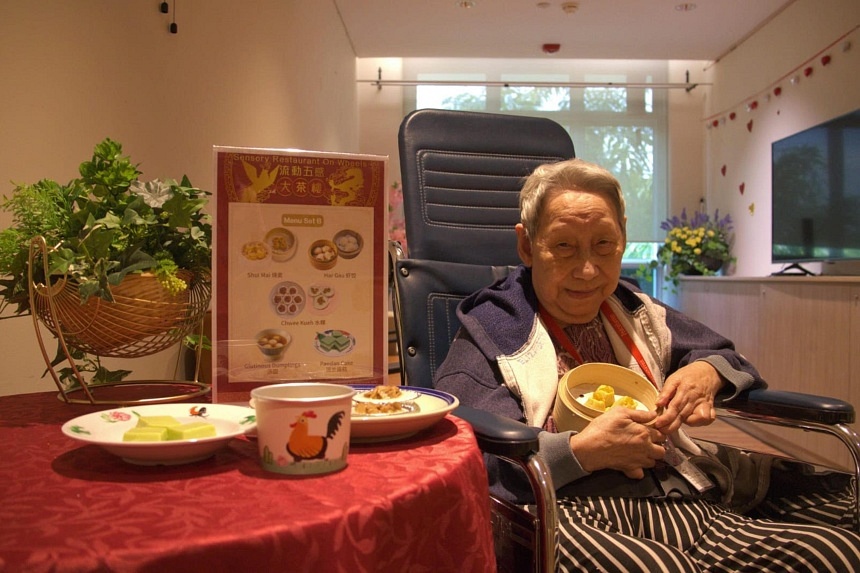SINGAPORE – Most days, Madam Elizabeth Low, 85, is given pureed food or a milk supplement for her meals at the nursing home she stays in.
But on Oct 23, for the first time she could remember, she had a “yum cha” menu of siu mai (pork and shrimp dumplings), har gow (shrimp dumplings) and chwee kueh (steamed rice cakes), topped off with pandan cake and tang yuan (glutinous rice balls) for dessert.
The senior, who has a sweet tooth, polished off the pandan cake in seconds. She has moderate dementia and swallowing difficulties.
“I love it,” said Madam Low, who stays at The Salvation Army’s Peacehaven Nursing Home in Upper Changi. Asked if she wants to have such a meal every day, she said: “If they can.”
Madam Low was among 90 nursing home residents who took part in a pilot programme by the Singapore University of Social Sciences (SUSS) and a Hong Kong social enterprise, The Project Futurus. The organisations teamed up to prepare soft-meal versions of familiar local dishes, ensuring that the food items retain their original shape and flavour while being easy to swallow.
Such food caters to people with dysphagia, a condition with swallowing difficulties that affects between 58,000 and 174,000 individuals aged 65 and above in Singapore. Dysphagia can affect people who have had a stroke, neurological disorders such as Parkinson’s disease and multiple sclerosis, and disease or injury to the head, neck, throat or oesophagus.
A chef from The Project Futurus team prepared each dish by blending siu mai, for instance, with water and enzymes using a Japanese soft-meal enzyme technique to get a gel texture. He then moulded the food to resemble their original forms.
The end product tastes the same as the original siu mai, but with a different texture and a reduced risk of choking.
In Singapore, the Ministry of Health introduced the EatSafe SG initiative in 2019 to improve safe swallowing practices for patients with dysphagia.
But despite efforts in training caregivers to prepare suitable meals, many patients still face limited food options, said Dr Carol Ma, head of gerontology programmes at SUSS.
In a week-long feasibility study from Oct 21 to Oct 25, The Project Futurus and SUSS held workshops for 120 care staff and served the meals at three nursing homes – Catholic Welfare Services’ St Joseph’s Home, Methodist Welfare Services Bethany Nursing Home, and The Salvation Army Peacehaven Nursing Home.
The residents dined in a room decorated to look like a traditional Cantonese restaurant, complete with nostalgic music and volunteer waitresses pushing carts of dim sum. Called Sensory Restaurant on Wheels, the aim of the initiative was to create a dining experience that brought back fond memories for the elderly.

